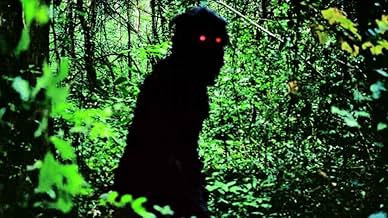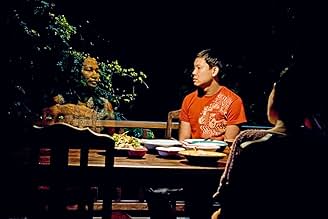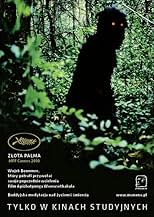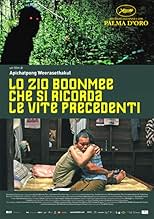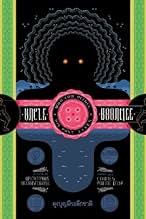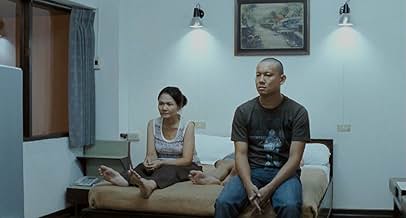Uncle Boonmee Who Can Recall His Past Lives
Original title: Loong Boonmee raleuk chat
IMDb RATING
6.7/10
18K
YOUR RATING
Dying of kidney disease, a man spends his last, somber days with family, including the ghost of his wife and a forest spirit who used to be his son, on a rural northern Thailand farm.Dying of kidney disease, a man spends his last, somber days with family, including the ghost of his wife and a forest spirit who used to be his son, on a rural northern Thailand farm.Dying of kidney disease, a man spends his last, somber days with family, including the ghost of his wife and a forest spirit who used to be his son, on a rural northern Thailand farm.
- Director
- Writers
- Stars
- Awards
- 11 wins & 25 nominations total
Kanokporn Tongaram
- Roong
- (as Kanokporn Thongaram)
- …
- Director
- Writers
- All cast & crew
- Production, box office & more at IMDbPro
Featured reviews
I really do wish I could like this. As it is, I think it has some dazzling sequences, and some really atmospheric and hypnotizing scenes. For the most part though, it didn't amount to much for me, and that's because I was just really bored by a lot of it. This really just comes down to whether one is hypnotized or bored by it, and unfortunately for me it was the latter. That doesn't mean that it's an awful film, it has way too much originality in what I saw to label it as such (and whether it has anything to really say is anyone's guess). Still, I wouldn't recommend this to most people, simply because it's so hard to get into. Not recommended.
This was a hard film to rate. It pains me not to have fallen in love with it. Here, then, are some scattered thoughts of my failed romance.
It started with a very sour first date. It also ended there.
I went in looking to see a film that won the Golden Palm at Cannes 2010. Knowing this fact, and having seen the trailer, I went to the theater expecting to see an art house piece with Oriental metaphysical overtones. What I saw was, to be sure, a decisively original and at times hauntingly beautiful film, but one that I found an absolute bore: a film that, to me, seemed a tiresome, dysfunctional, inchoate potpourri of disjunct elements that never quite flowed together.
Perhaps false expectations can ruin a movie. Or, perhaps, let me hazard the unlikely suggestion, there is nothing here to salvage? For let me be clear: I wanted to like this film, I really did. It is important to reward originality and craftsmanship, always. And I respect the film (or at least its intentions). But the fact remains (here comes the unavoidable, brutal, decisive fact), I didn't like it. I only liked a few scenes here and there. Some parts I hated, absolutely loathed. Despite a few glimmerings of genius - and an undoubted air of originality - it seems to be that Uncle Boonmee is a needlessly difficult, slow-paced and ultimately unsuccessful film... despite the fact that it gets to a great start and carries a lot of potential all the time. Perhaps the "elusive" quality mentioned by the high-praise reviewers is a mask behind which there is no greater coherence to be found. Perhaps the inchoate structure and the belaboured pacing are not marks of genius but amateurish vices committed in the name of some grand vision that shall forever remain out of our material reach. I fault this film not because of its weird themes or its occasional dream logic. On the contrary, I think that it may even be that the film wasn't weird enough or dreamy enough; perhaps this film's use of "magic realism" is a kind of materialistic trap that forces the movie into long, never-ending sequences of absolutely no consequence. The main vice of the film is its unadventurous reliance on fixed camera frames and boring, dragging shots. Editing between the scenes is tortuously snail-paced and almost morphine-mimicking in its soporific entailments.
Whatever the reason, the film feels too much jumbled together, like some heavy stone stuck in a spiritual limbo, or a unicorn eating a burger, or some such nonsense. Ironically, the main stumbling block for the film, if you ask me, is not its "artsiness", but its clumsy down-to-Earthness. The film seems to be grasping for some supreme realism and materialism underneath its spiritual, religious and metaphysical surface. But the result is a kind of Ken Loach of Buddhism: a boring materialism under the guise of animistic spiritualism. Just plain realism without a purpose: people doing boring stuff for boring reasons.
Or perhaps all this is wrong; perhaps all this analysis is useless. Perhaps we are back to false expectations again: I expected one thing and saw another. But who cares WHY I didn't like it? Surely all this is uninteresting? Well, perhaps, but let me say that my personal dilemma - how I wanted to love this film so much but ended up almost hating it - is an interesting story to tell, because this film has the potential to divide audiences totally, into "haters" and "praisers" - and very few lukewarm receivers in between. I definitely recommend this film to be seen, but I am not going to play the art house card, the usual cop-out: "I'm sure it's a masterpiece, I just didn't get it", and then give it a score of 8 or 9 despite having hated it myself, out of some duty-bound, deranged, depersonalized sense of professional duty or peer pressure to agree with everybody else, or - worse yet - pretend to love the film because of some unhealthy respect for the jury at Cannes or the snidely snobbish world film press. No, this would be a scandalous road to take. One must stand by one's convictions, and it is my personal conviction, based on one viewing, that here we have an ultimately pretty bad film: a failed exercise at grafting something sublime. Despite its undoubtedly pure and original intentions and beginnings, this film remains an overrated (soon to be over-venerated), perplexing, highly original turd - interesting but ultimately vacuous, like some of Buñuel's lesser works, or like Andy Warhol's art.
Whether I change my opinion after a second, or third, viewing remains to be seen. So, despite my dislike of the film's overall structure, I feel that this is an important film, and I can easily recommend it to all movie lovers. Everyone remotely interested in film should go and see, form their OWN opinion, of such a remarkable cinematic piece: a film that, despite its flaws and vices, is undoubtedly a creation of unique character and visionary qualities. Weerasethakul's directorial voice is loud and persistent, and its echo will surely be heard for many years to come across the lands - and cinema screens - the world over.
Now, let him only refine his voice a bit and convince us skeptics.
Whether my love for this film will grow, who knows. I'm preparing for the inevitable "second date" - the future second attempt at falling in love - with a strange expectation of more melancholy moods.
It started with a very sour first date. It also ended there.
I went in looking to see a film that won the Golden Palm at Cannes 2010. Knowing this fact, and having seen the trailer, I went to the theater expecting to see an art house piece with Oriental metaphysical overtones. What I saw was, to be sure, a decisively original and at times hauntingly beautiful film, but one that I found an absolute bore: a film that, to me, seemed a tiresome, dysfunctional, inchoate potpourri of disjunct elements that never quite flowed together.
Perhaps false expectations can ruin a movie. Or, perhaps, let me hazard the unlikely suggestion, there is nothing here to salvage? For let me be clear: I wanted to like this film, I really did. It is important to reward originality and craftsmanship, always. And I respect the film (or at least its intentions). But the fact remains (here comes the unavoidable, brutal, decisive fact), I didn't like it. I only liked a few scenes here and there. Some parts I hated, absolutely loathed. Despite a few glimmerings of genius - and an undoubted air of originality - it seems to be that Uncle Boonmee is a needlessly difficult, slow-paced and ultimately unsuccessful film... despite the fact that it gets to a great start and carries a lot of potential all the time. Perhaps the "elusive" quality mentioned by the high-praise reviewers is a mask behind which there is no greater coherence to be found. Perhaps the inchoate structure and the belaboured pacing are not marks of genius but amateurish vices committed in the name of some grand vision that shall forever remain out of our material reach. I fault this film not because of its weird themes or its occasional dream logic. On the contrary, I think that it may even be that the film wasn't weird enough or dreamy enough; perhaps this film's use of "magic realism" is a kind of materialistic trap that forces the movie into long, never-ending sequences of absolutely no consequence. The main vice of the film is its unadventurous reliance on fixed camera frames and boring, dragging shots. Editing between the scenes is tortuously snail-paced and almost morphine-mimicking in its soporific entailments.
Whatever the reason, the film feels too much jumbled together, like some heavy stone stuck in a spiritual limbo, or a unicorn eating a burger, or some such nonsense. Ironically, the main stumbling block for the film, if you ask me, is not its "artsiness", but its clumsy down-to-Earthness. The film seems to be grasping for some supreme realism and materialism underneath its spiritual, religious and metaphysical surface. But the result is a kind of Ken Loach of Buddhism: a boring materialism under the guise of animistic spiritualism. Just plain realism without a purpose: people doing boring stuff for boring reasons.
Or perhaps all this is wrong; perhaps all this analysis is useless. Perhaps we are back to false expectations again: I expected one thing and saw another. But who cares WHY I didn't like it? Surely all this is uninteresting? Well, perhaps, but let me say that my personal dilemma - how I wanted to love this film so much but ended up almost hating it - is an interesting story to tell, because this film has the potential to divide audiences totally, into "haters" and "praisers" - and very few lukewarm receivers in between. I definitely recommend this film to be seen, but I am not going to play the art house card, the usual cop-out: "I'm sure it's a masterpiece, I just didn't get it", and then give it a score of 8 or 9 despite having hated it myself, out of some duty-bound, deranged, depersonalized sense of professional duty or peer pressure to agree with everybody else, or - worse yet - pretend to love the film because of some unhealthy respect for the jury at Cannes or the snidely snobbish world film press. No, this would be a scandalous road to take. One must stand by one's convictions, and it is my personal conviction, based on one viewing, that here we have an ultimately pretty bad film: a failed exercise at grafting something sublime. Despite its undoubtedly pure and original intentions and beginnings, this film remains an overrated (soon to be over-venerated), perplexing, highly original turd - interesting but ultimately vacuous, like some of Buñuel's lesser works, or like Andy Warhol's art.
Whether I change my opinion after a second, or third, viewing remains to be seen. So, despite my dislike of the film's overall structure, I feel that this is an important film, and I can easily recommend it to all movie lovers. Everyone remotely interested in film should go and see, form their OWN opinion, of such a remarkable cinematic piece: a film that, despite its flaws and vices, is undoubtedly a creation of unique character and visionary qualities. Weerasethakul's directorial voice is loud and persistent, and its echo will surely be heard for many years to come across the lands - and cinema screens - the world over.
Now, let him only refine his voice a bit and convince us skeptics.
Whether my love for this film will grow, who knows. I'm preparing for the inevitable "second date" - the future second attempt at falling in love - with a strange expectation of more melancholy moods.
I just finished watching this movie for the second time. I saw it twice because I was torn between making the decision of whether it was absolute garbage, or a work of genius. It's pretty much garbage. Sorry.
Picture this: you download some pictures of Thai forests and caves from National Geographic. You then download "Forest Sounds Vol. 2". You play a slide-show of these pictures whilst listening to the ominous and atmospheric sounds of the jungle. After about 10 minutes, you stop what you're doing and sit in a corner for an hour and a half. Then, you go back to your slide-show and sound effects for another 10 minutes. This is the movie in a nutshell.
There are some beautiful shots within the movie, and it's obvious there was some talent because they make a point to keep these still shots on the screen for as long as possible. The background sounds add a lot to the movie as well, but everything else was just plain bad. All of the acting was quiet and monotonous, and it didn't make it seem more natural at all.
The dialogue was terrible. Nothing made sense. As much as I would love to be even more pretentious about movies than I already am, and rave about how people don't understand this movie, there actually is really nothing to understand. All of the characters were the same. Any subtleties within them are just projections of the viewer filling in the blanks, and believe me, they are blank.
The majority of the movie was filler.
Garbage.
Picture this: you download some pictures of Thai forests and caves from National Geographic. You then download "Forest Sounds Vol. 2". You play a slide-show of these pictures whilst listening to the ominous and atmospheric sounds of the jungle. After about 10 minutes, you stop what you're doing and sit in a corner for an hour and a half. Then, you go back to your slide-show and sound effects for another 10 minutes. This is the movie in a nutshell.
There are some beautiful shots within the movie, and it's obvious there was some talent because they make a point to keep these still shots on the screen for as long as possible. The background sounds add a lot to the movie as well, but everything else was just plain bad. All of the acting was quiet and monotonous, and it didn't make it seem more natural at all.
The dialogue was terrible. Nothing made sense. As much as I would love to be even more pretentious about movies than I already am, and rave about how people don't understand this movie, there actually is really nothing to understand. All of the characters were the same. Any subtleties within them are just projections of the viewer filling in the blanks, and believe me, they are blank.
The majority of the movie was filler.
Garbage.
For those who have not heard of Thai filmmaker and artist Apichatpong Weerasethakul, I guess you must have heard of his latest film Uncle Boonmee Who Can Recall His Past Lives, winning the Palme d'Or at last year's Cannes Film Festival, and being the first Southeast Asian director to do so. That should interest you to take that leap of faith to experience the coming of Uncle Boonmee yourself, and that feeling of being frustrated yet enthralled, fascinated yet perplexed, all at the same time, fighting to stay engaged, and making sense of the visuals flitting around dreamscapes.
This film is like a diamond with many different cuts made to make it shine, each representing a facet from which you can choose to look at, or interpret from. Like a prism which dissipates light shone on it, your take on this film will likely be entirely different from mine, and what more, you'll probably have different takes on each of the different aspects of the film, since the scenes that make it up are as disparate as can be. It makes the film going experience a little more interesting since it's open, and never crystal clear given the takeaways for one based on one's journey in life thus far.
At its crux, the story is exactly that of its title, where we see Uncle Boonmee (Thanapat Saisaymar) living the last days of his life with kidney failure, choosing like most Asians do with the preference to live out the last days at the comfort of one's home, rather than at a sterile hospital. It is said that those on the death bed will see their life flash pass their eyes, but for Uncle Boonmee, his plodding walk toward the light at the end of the tunnel, means giving the film a lot more exploratory path to tread on, with a look at what his past lives were as well, ranging from the suggested buffalo, to even a member of the aristocracy (and that much talked about scene with the catfish. Hmm... maybe he could be the catfish too!)
Things get a lot stranger of course, even as it seems that Boonmee can remember his previous lives before reincarnation. As far as my limited grasp of that process goes, one has to drink up a liquid that will make you forget what you've gone through, and one's karma accumulation has bearings on what next you'll be incarnated, with the human form being quite OK, rather than an animal. I suppose Boonmee in his previous life did OK to be reincarnated as a human in this life, and in his last days get visited by his late wife (Natthakarn Aphaiwonk) with whom he shares a poignant, heart-wrenching scene with, and also a visit from his son (Geerasak Kulhong behind heavy makeup), whom you'd have already have an idea of from the various promotional material, and no, he's not captured in a picture just because the camera did not have an anti-red eye function.
Don't be shy if you don't understand the film. For starters, I suppose any film based on dreams and fantasy opens itself up to a lot of leeway in interpretation, and not taking everything verbatim, verbose or literal. Even the auteur himself has said that you "don't need to understand everything" in an interview with The Guardian, probably a relief for those like me who emerged from the screening with more questions than to know where to begin asking them. Like most art films, this one moves at a leisurely pace, and is filled with plenty of art house sensibilities and techniques, and while I won't say will reward the patient viewer, it will challenge you to think through about what you've just seen, and I felt it was easier to make sense of individual scenes, than as a whole when trying to fit the jigsaw in a coherent fashion.
To paraphrase Bruce Lee, this film is like water, having no form of its own, yet taking up form based on the viewer's individual experience and interpretation. I guess that's what makes Uncle Boonmee unique, coming from a filmmaker who's bold to conceptualize this piece of art that works itself through different strokes for different folks.
This film is like a diamond with many different cuts made to make it shine, each representing a facet from which you can choose to look at, or interpret from. Like a prism which dissipates light shone on it, your take on this film will likely be entirely different from mine, and what more, you'll probably have different takes on each of the different aspects of the film, since the scenes that make it up are as disparate as can be. It makes the film going experience a little more interesting since it's open, and never crystal clear given the takeaways for one based on one's journey in life thus far.
At its crux, the story is exactly that of its title, where we see Uncle Boonmee (Thanapat Saisaymar) living the last days of his life with kidney failure, choosing like most Asians do with the preference to live out the last days at the comfort of one's home, rather than at a sterile hospital. It is said that those on the death bed will see their life flash pass their eyes, but for Uncle Boonmee, his plodding walk toward the light at the end of the tunnel, means giving the film a lot more exploratory path to tread on, with a look at what his past lives were as well, ranging from the suggested buffalo, to even a member of the aristocracy (and that much talked about scene with the catfish. Hmm... maybe he could be the catfish too!)
Things get a lot stranger of course, even as it seems that Boonmee can remember his previous lives before reincarnation. As far as my limited grasp of that process goes, one has to drink up a liquid that will make you forget what you've gone through, and one's karma accumulation has bearings on what next you'll be incarnated, with the human form being quite OK, rather than an animal. I suppose Boonmee in his previous life did OK to be reincarnated as a human in this life, and in his last days get visited by his late wife (Natthakarn Aphaiwonk) with whom he shares a poignant, heart-wrenching scene with, and also a visit from his son (Geerasak Kulhong behind heavy makeup), whom you'd have already have an idea of from the various promotional material, and no, he's not captured in a picture just because the camera did not have an anti-red eye function.
Don't be shy if you don't understand the film. For starters, I suppose any film based on dreams and fantasy opens itself up to a lot of leeway in interpretation, and not taking everything verbatim, verbose or literal. Even the auteur himself has said that you "don't need to understand everything" in an interview with The Guardian, probably a relief for those like me who emerged from the screening with more questions than to know where to begin asking them. Like most art films, this one moves at a leisurely pace, and is filled with plenty of art house sensibilities and techniques, and while I won't say will reward the patient viewer, it will challenge you to think through about what you've just seen, and I felt it was easier to make sense of individual scenes, than as a whole when trying to fit the jigsaw in a coherent fashion.
To paraphrase Bruce Lee, this film is like water, having no form of its own, yet taking up form based on the viewer's individual experience and interpretation. I guess that's what makes Uncle Boonmee unique, coming from a filmmaker who's bold to conceptualize this piece of art that works itself through different strokes for different folks.
Incoherent, unpredictable, mystical, yet undoubtedly original, "Uncle Boonmee Who Call Recall His Past Lives" is a pseudo-profound cinematic venture that reeks with allegory and mythical undertones. After watching this film, I've come to a conclusion that it is certainly not for everyone.
Despite its strange recurring themes about supernatural beings, spirits, Buddhist philosophy, karma, and reincarnation, it will bathe you with its gentleness and natural ornateness. It is intimate and surprisingly elegant, though not without its flaws.
Much like Terrence Malick's "Tree of Life," this motion picture lacks a linear narrative. It doesn't have what most of us would require from a movie: a plot. It heavily relies on hypnotic images captured into still wide frames that often drag longer than the easily-bored viewer can bear.
Then there's the noticeable absence of a musical score. You never get to hear music until the last few minutes of the film; all you'll hear besides the dialogues are crickets, the rustling of leaves, a water buffalo, the sound of an electric fly swatter zapping flying bugs, footsteps, a waterfall, and a talking catfish that made love to a disfigured princess.
Simple and ambitious; primitive and modern; eerie and comforting; senseless and driven; and dull and brilliant, this Thai film gives you a one-of-a-kind viewing experience. If you are into esoteric art films, this is something I would highly recommend. If you loathe movies that seem to have no meaning, then this is not for you.
Confounding as it is, "Uncle Boonmee..." is a film that doesn't need to be understood; it simply has to be FELT.
Despite its strange recurring themes about supernatural beings, spirits, Buddhist philosophy, karma, and reincarnation, it will bathe you with its gentleness and natural ornateness. It is intimate and surprisingly elegant, though not without its flaws.
Much like Terrence Malick's "Tree of Life," this motion picture lacks a linear narrative. It doesn't have what most of us would require from a movie: a plot. It heavily relies on hypnotic images captured into still wide frames that often drag longer than the easily-bored viewer can bear.
Then there's the noticeable absence of a musical score. You never get to hear music until the last few minutes of the film; all you'll hear besides the dialogues are crickets, the rustling of leaves, a water buffalo, the sound of an electric fly swatter zapping flying bugs, footsteps, a waterfall, and a talking catfish that made love to a disfigured princess.
Simple and ambitious; primitive and modern; eerie and comforting; senseless and driven; and dull and brilliant, this Thai film gives you a one-of-a-kind viewing experience. If you are into esoteric art films, this is something I would highly recommend. If you loathe movies that seem to have no meaning, then this is not for you.
Confounding as it is, "Uncle Boonmee..." is a film that doesn't need to be understood; it simply has to be FELT.
Did you know
- TriviaShot on 16mm film rather than digital. Director Apichatpong Weerasethakul wanted to film in this format as the film is all about dying traditions.
- GoofsThe first time a ghost appears, during dinner, the nephew passes the ghost a glass of water. You can see the ghost image superimposed over the nephew's arm when he places the glass of water on the table.
- ConnectionsFeatured in At the Movies: Cannes Film Festival 2010 (2010)
- How long is Uncle Boonmee Who Can Recall His Past Lives?Powered by Alexa
Details
- Release date
- Countries of origin
- Official sites
- Languages
- Also known as
- Bác Boonmee
- Filming locations
- Production companies
- See more company credits at IMDbPro
Box office
- Gross US & Canada
- $184,292
- Opening weekend US & Canada
- $23,540
- Mar 6, 2011
- Gross worldwide
- $1,214,424
- Runtime1 hour 54 minutes
- Color
- Sound mix
- Aspect ratio
- 1.85 : 1
Contribute to this page
Suggest an edit or add missing content

Top Gap
What is the Hindi language plot outline for Uncle Boonmee Who Can Recall His Past Lives (2010)?
Answer

